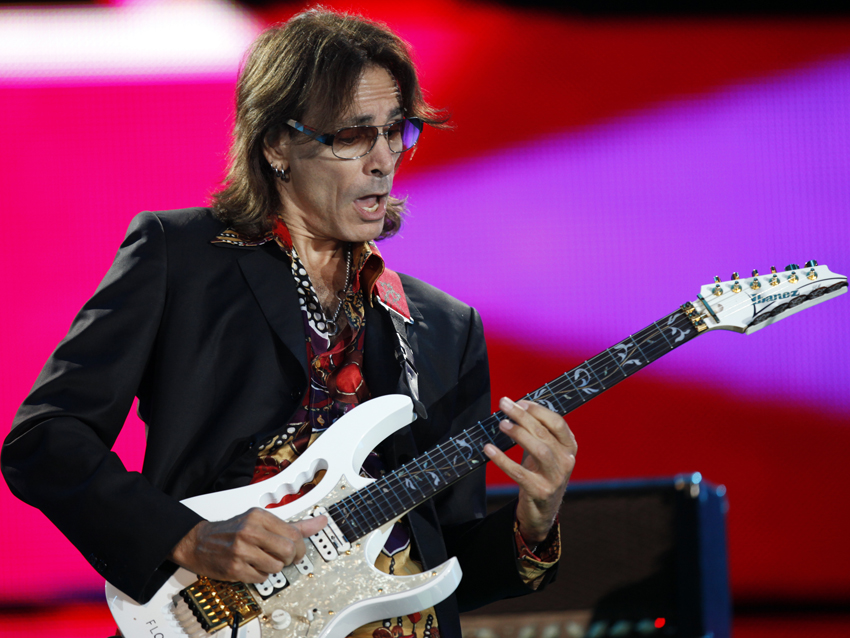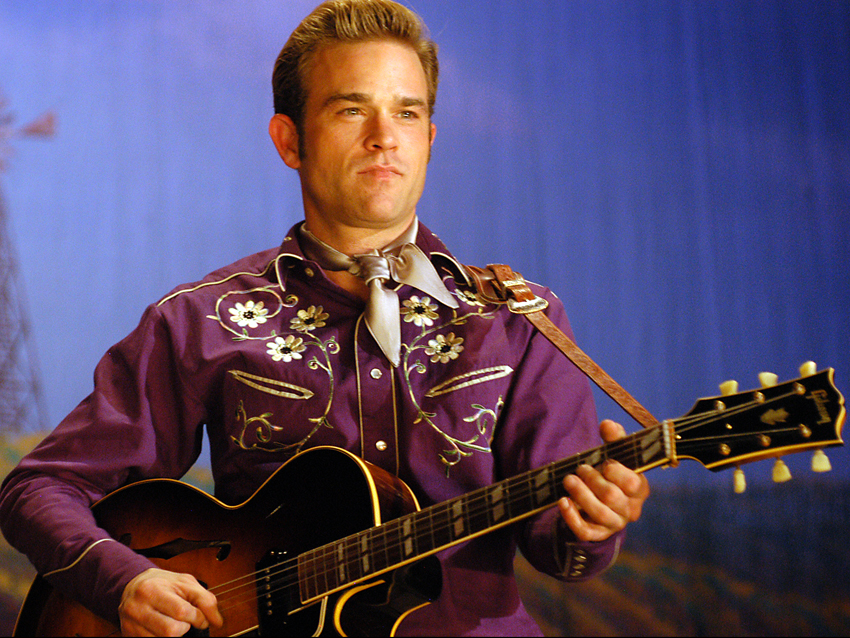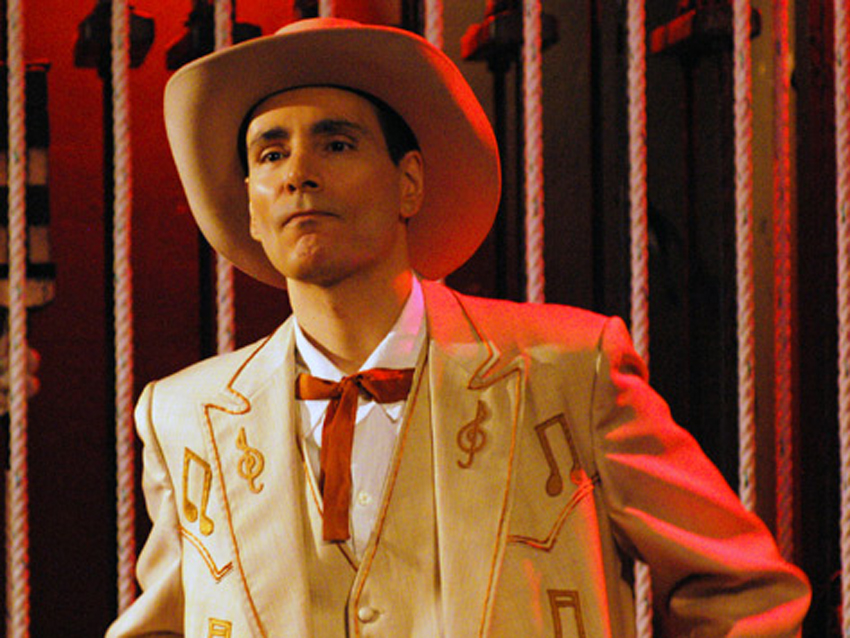
Steve Vai admits that becoming a movie producer was never high on his things-to-do list. But the celebrated, Grammy Award-winning guitar virtuoso is one of the executive producers of the film Crazy, which tells the story of guitar legend Hank Garland, one of the most influential session men who emerged from Nashville during the 1950s.
"I've certainly been familiar with Hank Garland's music," says Vai, "but I didn't really know a lot about his story. What I discovered was what an important figure he was. He introduced jazz to the Nashville scene, and he was one of the first guitarists to confront racial stereotypes by playing with black musicians, which rattled a lot of cages back then. When my partner, Ray Scherr, brought me the project, I was drawn right in."
Waylon Payne, an actor as well as a musician, nails the role of the freakishly gifted Garland, who rose to fame by playing on hits by artists such as Elvis Presley, Roy Orbison, Patsy Cline and The Everly Brothers, among others. But Crazy isn't merely the story of a musician and his guitar; it captures the milieu of the '50s Nashville studio scene, a time when the fabled 'Nashville Mafia' controlled the record-making process to the point of ostracizing anyone who attempted to buck the system.
"Hank was seen as a bit of a troublemaker, says Vai, "somebody who wasn't satisfied with the status quo. But he was also a visionary, and among his contributions was the design and creation of the Gibson Byrdland guitar."
In 1961, Garland was critically injured in a car accident - in the film, the Nashville mob is seen as having caused the crash - and later, he was admitted to a psychiatric hospital, where he received numerous electroconvulsive therapies. He never regained his guitar playing prowess, and spent the last decades of his life in virtual solitude in Florida. He died just as Crazy was going into production.
MusicRadar sat down with Vai to discuss Hank Garland and the making of Crazy (available now on DVD and Blu-ray). "It was quite an experience putting the picture together," he says. "I learned so much about movies and how and why they get made, I think I could write a book about it all."
Your partner, Ray Scherr, presented the idea of the movie Crazy to you. How involved did you get with its actual making?
Want all the hottest music and gear news, reviews, deals, features and more, direct to your inbox? Sign up here.
"In some ways, I was very involved, and in others I wasn't. Ray came across this story, which was based on true events, and he loved it. Ray is the founder of the Guitar Center. He's a real guitar lover, and he likes the style of music that Hank Garland played. Ray has what is probably the premier archtop guitar collections in the world. I got very interested in the story, and he asked me if I wanted to work on the project. I'm a pretty resourceful guy, and I felt like it was the right time to get involved with a lot of the behind-the-scenes aspects of the film industry. Everything felt right.
"I didn't have a lot to do with the story and the writing, but when it came down to the production elements, I was very hands-on. I watched the budgets and facilitated certain aspects of the filming and the editing. We had a great director, Rick Bieber, and he produced the film, as well. You know how it is - with films, there's a lot of people who are listed as 'executive producers' and 'associate producers,' and not to say that you don't need everybody to do their jobs, but Rick is the true producer and director, and he worked on the screenplay, too. He did a marvelous job."
As you've said, you knew Hank's music, but you weren't very familiar with his story.
"That's right. Years ago, when I was studying jazz players, I came across Hank and discovered his catalogue. In fact, when I started Favored Nations, one of my goals was to dig up all of these jazz album nuggets that were never properly released and get them out there - until I realized that the market for them is quite limited. I had to make a business decision as to whether I would spend two years of my life doing that or making my own albums. But I was certainly aware of Hank's contributions to music and guitar playing before I learned the whole story of his life."
How accurate is the screenplay as to the real events? Was there, in fact, a Nashville Mafia that controlled the studios and the musicians?
"That's something I was never really clear on. The story as we were told was from Hank's brother. Hank was definitely a cat on the scene, and he was one of the first to start playing jazz down in the South. Plus, he was one of the first of the Nashville guys to start playing with black musicians. He did have some sort of a dynamic with the powers that be. But again, we took the story that his brother told us, and we used all of those details for the film."
Hank, of course, did get into a car accident, which in the film is played as an attempt on his life by the Nashville Mafia.
"Yes, he did get into a serious car accident, that's true. And he did receive 101 electroshock therapies, which basically lobotomized him."
Did you ever meet Hank?
"I did. I met him down at his home in Florida. He was very quiet, but every once in a while he'd lift his head up and say something. You know, he was damaged, no doubt about it. But at one point he picked up the guitar and played a bit. Because of everything he'd been through, he couldn't play very well, but you could tell there was still some juice there."
"It was fascinating. We watched a lot of old videos of him in his early days. He was a real sweetheart. Like I said, he didn't talk a lot, but he did say something that really stuck with me. He said, 'The music business can be hazardous to your health.' I thought, Oh my God, what a quote!"
Hank's playing spanned many genres, and he was so many hit records. How do you think he should be remembered? What would you call his true lasting musical contribution?
"He was an unbelievable session player and a real musical chameleon. And a great session player understands what a song needs to become a great piece of music. Hank knew that. Also, from what I was able to gather, he was a real pioneer for artist rights. Part of that came from not understanding the way the business is -"
But part of that is being a bit of a renegade.
"Oh, sure. He had what I call a 'chaos effect.' You never know how your actions - no matter how small, and they might seem like a ripple at the time - will ultimately affect the business or the way people play and think. Hank had that kind of impact, that chaos effect."
And, of course, he was very much a part of the design of the Byrdland guitar.
"That's right. Now, that's a very important contribution to music and guitars. When I was at his house, I read all of these letters between him and Gibson, and I saw how his requests and specifications - he was extremely meticulous in what he wanted and desired - came to be the Byrdland guitar, which was a very unique guitar at the time."
Waylon Payne does a remarkable job portraying Hank. Did you have anything to do with his casting?

Actor Waylon Payne as Hank Garland in Crazy
"To a degree, I was involved in a lot of it. From the beginning, I was confronted with doing the music. But I just said, 'Look, I can't do this music. I mean, I could, but it wouldn't be great. We need somebody who's really up on the style of music that Hank played from the era.' And Larry Klein came onboard and did the music, and he was just terrific. He did a much better job that I could've done.
"As far as the cast, you know, you hire a casting agent, and they read the script and sit down with the director. I was there and made suggestions. Of course, the first thing you try to do is get the big stars, and that was futile. [laughs] But then we looked at a bunch of reels, and I gave my thoughts."
Did the fact that Waylon is a musician as well as an actor help in choosing him for the role?
"It helped. But the main thing is, he's a great actor. When somebody like him comes into the room, you start to see him as Hank. And then, of course, when Ali came in and we saw the two of them together, there was such a great chemistry there. You go through a lot of people until you get to the right combination, and then it becomes rather obvious."
Speaking of casting, you're in the film, as well. You play Hank Williams - but it's one of those blink-and-you-might-miss-it cameos. A) Why didn't you give yourself more screen time, and B) did you take the role just so you could wear that cool suit?
[laughs] "Well, frankly, I don't have any aspirations to be an actor. But everybody said, 'C'mon, Steve. You kind of look like Hank Williams, you should do it.' So I said, 'All right, all right. It'll be a few hours and I'll have some fun with it.' I did like what I had to wear, that was cool. And it was fun trying out a Southern accent.
"Even though I don't see myself acting per se, there's elements of it I do like. One thing I really don't like, though, is the time is takes. You literally spend all day waiting to shoot a scene; then when it's your turn to do a scene it's only for a minute and somebody says, 'Cut!' I don't like waiting around like that. It's so different from what I'm used to, to being on stage when you're 'on' the entire time.
"Another thing I realized is that acting is a real art. You know, after I did [the 1986 film] Crossroads, I got calls to try out for various movies. So I took some acting lessons, and while I did enjoy them, I realized that you really had to work at it and put your heart in soul into it. At that point I had to say to myself, 'Wait a minute. Am I an actor or a musician?' And I much prefer being a musician. But it's fun to jump in occasionally. And to play Hank Williams - hey, why not?" [laughs]

Steve Vai, impeccably attired, as Hank Williams in Crazy
Crazy is an independent film, and obviously you didn't have $100 million to spend on it. Yet it looks amazing - the sets, the wardrobe, the whole tone of the picture. Every penny is on the screen.
"Frankly, the film cost $5 million, which is a pretty robust budget for an independent film. And we shot probably 40 percent more than we needed. But the film looks great because the director is a very experienced producer. Watching Rick Bieber work was fascinating. He really knew how to get things done, and he was so aware of what was needed to capture the authenticity of the time period we were dealing with. I couldn't have done that."
When you finished the picture, what was the initial response?
"It's interesting: Once you finish a picture, you take it to test audiences and you get graded. Our first test came back as 'average,' and that's not good. So we did major re-editing and did another test and it came back as 'excellent.' Then we submitted it to all the film festivals and we won in 17 of them. Fifteen of them were first prize for Best Film."
Why didn't Crazy get a theatrical release? It's coming out on DVD and Blu-ray, but with the awards the picture received, one would think that it would've played in theaters.
"Well, in order to get a theatrical release, a film company has to invest something like $30 million. Advertising…promotion - it takes a lot of money for a film to even get to the public. We took it to every big distributor and every little distributor, and there's certain things that they look for and we just didn't have them. It's not a genre film - it's not horror, it's not drama, it's not comedy. You can make the most awful slasher picture in the world for $200,000 and get a theatrical release, because the statistics show that a certain amount of people will go see such a film no matter how bad it is.
"So we had a docu-drama about a musician that not a lot of people know. That's a big strike against you. And the biggest problem was that we didn't have an A-list star. When you look at the percentage of the films that get theatrical releases, it's very, very small. So we decided to go for a DVD release.
"Still, I'm very optimistic about the film. I think it's an evergreen picture because it's about the guitar. I know a lot of film people and actors and sports stars, and when they go home, they want to play the guitar. There's not a lot of pictures like this one. Sean Penn did Sweet And Lowdown, which was a great film. And then there was Crossroads. So it's a picture for all of those people who love the guitar, and that's a big audience."
Joe is a freelance journalist who has, over the past few decades, interviewed hundreds of guitarists for Guitar World, Guitar Player, MusicRadar and Classic Rock. He is also a former editor of Guitar World, contributing writer for Guitar Aficionado and VP of A&R for Island Records. He’s an enthusiastic guitarist, but he’s nowhere near the likes of the people he interviews. Surprisingly, his skills are more suited to the drums. If you need a drummer for your Beatles tribute band, look him up.
